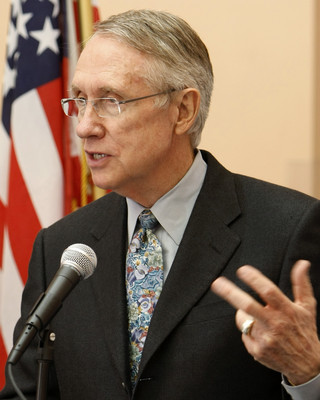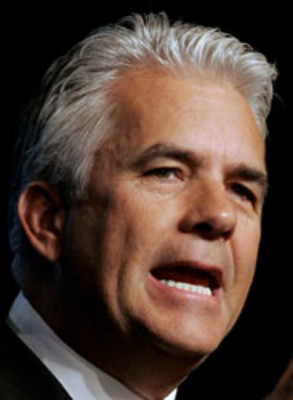Reid keeps leadership post; Ensign rises in GOP
WASHINGTON -- Sen. Harry Reid of Nevada was re-elected Senate majority leader Tuesday by a caucus of Democrats that swelled to at least 58 members as a result of this month's elections.
As a result of the Democratic gains, Reid will enter his second term as Senate leader with more clout than ever, and the responsibility that comes with it, according to political analysts.
In a separate gathering of Senate Republicans, Sen. John Ensign of Nevada was elected to head the group's policy committee, a step up in the leadership that will give him a voice as the party retools from losses for the second consecutive election.
Both Nevadans ran unopposed as the Senate reorganized in advance of the new session that will begin in January.
With both its senators in the upper rungs of leadership, Nevada's standing was further cemented as a player in national politics, according to state archivist Guy Rocha.
"You would have to say fairly and honestly that Nevada never in terms of leadership has been so well-represented," Rocha said. "It may be saying something about Nevada coming of age. I see it on so many levels. It is no longer a renegade, maverick state. Nevada is a player in the American political dynamic."
As chairman of the Republican Policy Committee, Ensign will rank No. 4 in the GOP leadership structure. The committee, with a staff of 15 to 20 and a budget of $1.6 million, researches legislation and policy matters, and provides the underpinning for which issues Republicans will promote and how.
The Nevadan becomes one of the top strategists as Republicans embark on self-examination after poor showings in the past two elections. The party lost six Senate seats in 2006, and seven seats so far in 2008, with races in Minnesota and Georgia yet to be decided.
Republicans "need to get back to our core principles of strong national defense, limited government, fiscal responsibility, education for our children and health care solutions that rely on the private market," Ensign said. "We got away from those principles."
Ensign advanced even though he presided this year over the National Republican Senatorial Committee, the party's campaign arm that fared poorly for the second consecutive election cycle.
Ensign said his performance at the NRSC, which got mixed reviews during election season, wasn't an issue among Republicans. Sens. Orrin Hatch of Utah and Mike Crapo of Idaho spoke on Ensign's behalf before he was approved by voice vote for the new post.
"The feedback I got since even before the election was over was that people really appreciated the job we did," Ensign said. "They thought we did an outstanding job. It was just circumstances out of our control" as Sen. Barack Obama led a Democratic tide across most parts of the country.
Royse Smith, a political science professor at the College of Southern Nevada, said Ensign was being rewarded.
"This is the way of the party saying this was a bright man, and he took the crap that came with the (campaign) job, and did as well as you could, so here is a step up," Smith said.
Reid was re-elected majority leader when Democrats gathered in the Old Senate Chambers, a room in the Capitol where the Senate met before the Civil War. It now is used for ceremonial purposes.
During Reid's first term as leader that is coming to an end, Democrats held only a 51-49 majority.
In a Senate where 60 votes are necessary to pass most legislation, he often expressed frustration at his inability to move Democratic bills on the Iraq war, immigration reform and global warming among other issues.
In the session that begins in January, Democrats will seat at least 58 senators, and maybe one or two more when results are final in the two races still being contested.
"This year has been particularly challenging for all Americans and with a narrow majority, passing timely legislation has at times been difficult," Reid said. "But I look forward to again leading my colleagues into the next session with a promise of unity and bipartisanship."
On Tuesday, Democrats also allowed Sen. Joe Lieberman, a Connecticut independent, to continue caucusing with their group and keep his prized chairmanship of the Homeland Security and Governmental Affairs Committee.
There had been pressure to punish Lieberman after he supported Republican Sen. John McCain for president while criticizing Obama during the campaign.
"As majority leader, Reid essentially has to rally the troops," Rocha said. Democrats "will have all the ingredients to move major agendas except they don't have the (60-vote) supermajority in the Senate."
The job for Reid, Rocha said, will be to keep Democrats united while persuading a few Republicans to cross over and vote with them on key issues.
Still, recruiting two or three Republican votes will be easier than having to recruit nine.
"He will have that challenge in terms of moving Obama's agenda in Congress," Rocha said.
Contact Stephens Washington Bureau Chief Steve Tetreault at stetreault@ stephensmedia.com or 775-783-1760.


















